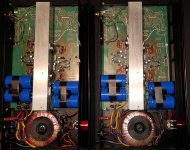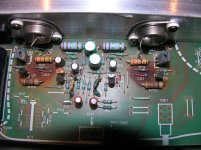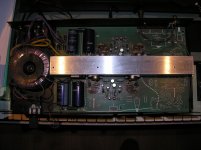After looking at the data sheet I assume the MJ15004 is the PNP and the MJ15003 is the NPN. So MJ15004 can replace the Musical Fidelity A3P output stage transistor, and the MJ15003 can replace the Musical Fidelity A3N. Did I get that right??? Sorry guys not an expert here....
gveugenio said:MJ15003 goes and which side the MJ15004 goes
Provided the PCB is the same as the one for the MA50 : the circuit on one side is mirrored compared to the other.
Think rails : both P's on the same side, both N's on the same side of the board.
You can see the orientation at the Hennessy home page pics.
Right.
Thanks. I plugged one of my Musical Fidelity MA65 mono blocks by accident while I was upgrading the electrolytic capacitors.
Instantly I saw smoke coming from the output stages so I unplugged right away. What else could have been damaged?? I also intend to change the driver transistors (bd139 and bd140). Any help is appreciated.
Instantly I saw smoke coming from the output stages so I unplugged right away. What else could have been damaged?? I also intend to change the driver transistors (bd139 and bd140). Any help is appreciated.
gveugenio said:............I plugged one of my Musical Fidelity MA65 mono blocks by accident while I was upgrading the electrolytic capacitors.
..
wait a sec - are you sure you are still alive ?
what "accident" was that you have connected amplifier with mains , while you're working on PSU ??
Hehe I'm still alive. I removed the cover and heatsink of my amp so I could upgrade the electrolytic capacitors (my MA65 is around 15years old).
I de-soldered all the old capacitors and inserted the new ones (not yet soldered). I then took a coffee break so I unplugged my soldering iron.
When I resumed my work I plugged the amplifier by accident thinking it was my soldering iron. I noticed burning smell coming from the output stages of my Musical Fidelity MA65 Mono Block. Upon noticing the output transistors being fried I unplugged the amp right away. The amp was just plugged around 30-40 seconds...
My friend a electronics engineer said class A amps will burn the output transistors instantly when run without the heat sink or without a load. He told me to just replace the output stages(MJ15003/4). What else could have been damaged?? Should I replace the driver transistors (BD139 and BD140) too??
I de-soldered all the old capacitors and inserted the new ones (not yet soldered). I then took a coffee break so I unplugged my soldering iron.
When I resumed my work I plugged the amplifier by accident thinking it was my soldering iron. I noticed burning smell coming from the output stages of my Musical Fidelity MA65 Mono Block. Upon noticing the output transistors being fried I unplugged the amp right away. The amp was just plugged around 30-40 seconds...
My friend a electronics engineer said class A amps will burn the output transistors instantly when run without the heat sink or without a load. He told me to just replace the output stages(MJ15003/4). What else could have been damaged?? Should I replace the driver transistors (BD139 and BD140) too??
gveugenio said:Hehe I'm still alive. .....
hehe
I'm glad ........
besides that - that sort of mix-up sounds somewhat familiar

do you know how to check bipolar transistor with diode test on your DVM ?
A1N, A1P = 2N3055 2N2955
A3N, A3P = MJ15003, MJ15004
MA50 is both channels of A1 in parallel, not bridged, but with higher voltage mains transformer and a few minor resistor value changes.
Mains transformers often (very often!!) go on these due to the heat.
I used to work for MF and often would leave several of these I had repaired on over-night soak test. It was a regular (2-3 times a week) thing to come into work and find an amp that had been fitted with a new transformer the day before dead, with a blown mains fuse and sorry looking toroid
These and the A1 run so hot that we used to warm up pasties and samosas for our lunch breaks on the amplifiers ! (yes we used grease proof paper...)
Tip: don't even think of doing anything to one of these amps before replacing all the electrolytics, preferably with 105 C ones.
A3N, A3P = MJ15003, MJ15004
MA50 is both channels of A1 in parallel, not bridged, but with higher voltage mains transformer and a few minor resistor value changes.
Mains transformers often (very often!!) go on these due to the heat.
I used to work for MF and often would leave several of these I had repaired on over-night soak test. It was a regular (2-3 times a week) thing to come into work and find an amp that had been fitted with a new transformer the day before dead, with a blown mains fuse and sorry looking toroid

These and the A1 run so hot that we used to warm up pasties and samosas for our lunch breaks on the amplifiers ! (yes we used grease proof paper...)
Tip: don't even think of doing anything to one of these amps before replacing all the electrolytics, preferably with 105 C ones.
MA50 - new electrolytics - wow!
Hi all! I have just completed a replacement programme of all the electrolytic capacitors in my MA50 monoblocs and WOW what amazing amplifiers these things are! I remembered them being praised to the skies in the days when they were available new (mid eighties) in magazines like HiFi Answers. At that time I could not afford such luxuries, but when I found a pair of these on ebay I bought them. I listened and thought I had made a mistake, but then I found Mark Hennessey's site and followed his advice about swapping the electrolytic capacitors as a first step to rejuvenating the amps. I have never done anything like this before, but i managed to work out how to make the changes and executed the soldering with great care (the circuit boards are old and the track has a tendency to come away some times). The results are FANTASTIC! I will post a list of the capacitors I used on Mark's brilliant site in a kind of homage to all he has done to help me. Good luck!
Hi all! I have just completed a replacement programme of all the electrolytic capacitors in my MA50 monoblocs and WOW what amazing amplifiers these things are! I remembered them being praised to the skies in the days when they were available new (mid eighties) in magazines like HiFi Answers. At that time I could not afford such luxuries, but when I found a pair of these on ebay I bought them. I listened and thought I had made a mistake, but then I found Mark Hennessey's site and followed his advice about swapping the electrolytic capacitors as a first step to rejuvenating the amps. I have never done anything like this before, but i managed to work out how to make the changes and executed the soldering with great care (the circuit boards are old and the track has a tendency to come away some times). The results are FANTASTIC! I will post a list of the capacitors I used on Mark's brilliant site in a kind of homage to all he has done to help me. Good luck!
Here, finally is the list of electrolytics I promised shown with approximate prices when I bought them a year ago.
MUSICAL FIDELITY MA50 Monobloc Power Amplifier
Components
In my Amp s/no: 761
In my Amp s/no: 739
Capacitors Make Model Deg C V mF
Make Model Deg C V mF
Replace with option Model Deg C V mF Supplier Qty Price
C1 Rubycon 7822AW 85 63 6800
Rubycon
85 63 6800
F&T F&T 6800uF 105 63 6800 AudioCap 8 £7.30 £57.68 C2 Rubycon 7822AW 85 63 6800
Rubycon
85 63 6800
C3 Rubycon 7822AW 85 63 6800
Rubycon
85 63 6800
C4 Rubycon 7822AW 85 63 6800
Rubycon
85 63 6800
C6 Rubycon
85 50 1
Rubycon
85 50 1
Multicomp MCRH63V105M5X11 105 63 1 CPC 8 £0.15 £1.20 C7 Rubycon
85 50 1
Rubycon
85 50 1
C8 Samhwa
85 63 10
Samhwa
85 63 10
NichiCon UPM1J100MDD 105 63 10 Digi-Key 12 £0.18 £2.16 C9 Samhwa
85 63 10
Samhwa
85 63 10
C10 Samhwa
85 63 10
Samhwa
85 63 10
C13 Samhwa
85 16 47
Samhwa
85 16 47
Sanyo 16SA47M 105 16 47 CPC 8 £1.12 £8.96 C14 Samhwa
85 16 47
Samhwa
85 16 47
MUSICAL FIDELITY MA50 Monobloc Power Amplifier
Components
In my Amp s/no: 761
In my Amp s/no: 739
Capacitors Make Model Deg C V mF
Make Model Deg C V mF
Replace with option Model Deg C V mF Supplier Qty Price
C1 Rubycon 7822AW 85 63 6800
Rubycon
85 63 6800
F&T F&T 6800uF 105 63 6800 AudioCap 8 £7.30 £57.68 C2 Rubycon 7822AW 85 63 6800
Rubycon
85 63 6800
C3 Rubycon 7822AW 85 63 6800
Rubycon
85 63 6800
C4 Rubycon 7822AW 85 63 6800
Rubycon
85 63 6800
C6 Rubycon
85 50 1
Rubycon
85 50 1
Multicomp MCRH63V105M5X11 105 63 1 CPC 8 £0.15 £1.20 C7 Rubycon
85 50 1
Rubycon
85 50 1
C8 Samhwa
85 63 10
Samhwa
85 63 10
NichiCon UPM1J100MDD 105 63 10 Digi-Key 12 £0.18 £2.16 C9 Samhwa
85 63 10
Samhwa
85 63 10
C10 Samhwa
85 63 10
Samhwa
85 63 10
C13 Samhwa
85 16 47
Samhwa
85 16 47
Sanyo 16SA47M 105 16 47 CPC 8 £1.12 £8.96 C14 Samhwa
85 16 47
Samhwa
85 16 47
 Okay, so if anyone is stil interested, I have made further discoveries and changes and I also need some help. Firstly, the changes: The areas I mentioned before which look brown and burnt in both amps that I thought was from the output transistors: wrong. The problems causing the brown areas were under-specced resistors and Zener diodes both of which were very much overheating. Resistors 13, 14, 18 and 19 on the right side and 113, 114, 18 and 19 on the left side were all massively overheating as were ZD 1 and 2 on both sides. They were replaced with uprated wattage in each case. Then I found that the resistor used with the mains LED was also shot on each amp. Again, replaced with an uprated wattage silencing the buzz previously heard when the amps were on. I also re-routed and tidied up some scruffy wiring and rubbed down and reprayed the casing (tops and sides) which really made them look good.
Okay, so if anyone is stil interested, I have made further discoveries and changes and I also need some help. Firstly, the changes: The areas I mentioned before which look brown and burnt in both amps that I thought was from the output transistors: wrong. The problems causing the brown areas were under-specced resistors and Zener diodes both of which were very much overheating. Resistors 13, 14, 18 and 19 on the right side and 113, 114, 18 and 19 on the left side were all massively overheating as were ZD 1 and 2 on both sides. They were replaced with uprated wattage in each case. Then I found that the resistor used with the mains LED was also shot on each amp. Again, replaced with an uprated wattage silencing the buzz previously heard when the amps were on. I also re-routed and tidied up some scruffy wiring and rubbed down and reprayed the casing (tops and sides) which really made them look good.Here's the bit I need help with: They sound good. Better than ever before, but one sounds less good than the other. I have searched around until I am going cross-eyed but cannot see what could be causing the problem. It sounds like there's a 6db loss in treble on one amp. Yes, I've tried swapping them and it's definitely one of the amps. Could it be that some other component is no longer working right? Could the transistors in the "hot" areas have been damaged? Until recently they have been very similar one to another but sice all the fettlin' this difference has become really apparent. Any ideas?
Could it be that some other component is no longer working right? Could the transistors in the "hot" areas have been damaged?
Could be something;-)
The circuit of the MA50 should be same as A1. But balanced.
MUSICAL-FIDELITY A1 AMPLIFIER SCHEMATIC Service Manual download, schematics, eeprom, repair info for electronics experts
The 2 amplifiers per channel are, according to Mark Hennesy, simply wired in parallel as a single monobloc amp. This will make them very difficult to troubleshoot unless they are separated at output and input. A classic case of "divide and conquer" and a need for matched performance and parts in either amp.
Musical Fidelity A1 › Other models
Musical Fidelity A1 › Other models
- Home
- Amplifiers
- Solid State
- musical fidelity MA50

